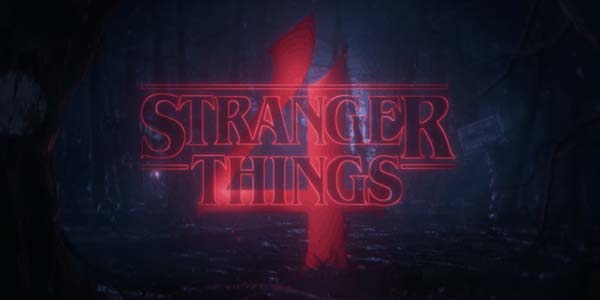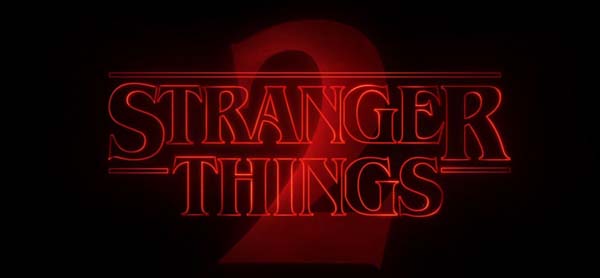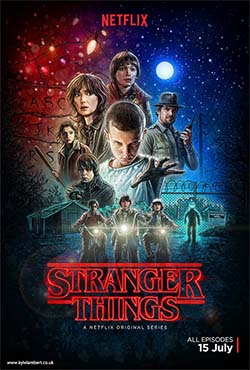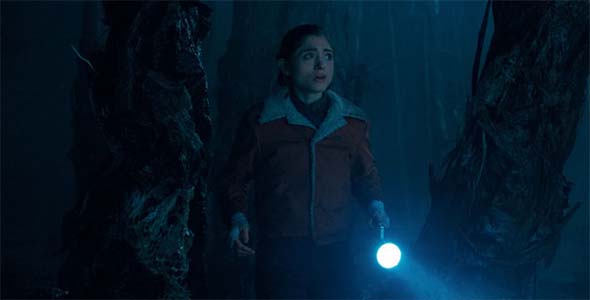
I never bothered reviewing the 3rd season of Stranger Things because I didn't really have strong feelings about it one way or the other. Season 3 was a bit of an improvement over season 2, but both were a resounding "meh" for me. The first half of season 4 is also kind of "meh", but I think that it's worth talking about this time around because it both succeeds tremendously where seasons 2 and 3 failed, but also then kind of ruins any goodwill that it had built up.
The fundamental problem that I have with Stranger Things after the first season is that a continuation of this same story simply doesn't need to happen. The first season worked so well, in large part, because of its intriguing mysteries. Aside from sequel bait, all the important questions and mysteries of season 1 were solved, and the first season felt satisfactorily resolved. If this show was going to have sequel seasons, then I think a more anthology-like approach would have been more appropriate, with each new season telling a new story, with new characters, confronting a completely new and unrelated horror, and solving completely new and unrelated mysteries.
By continuing with the same story, the audience gets to bring everything we know from the first season into the new story. Even though seasons 2 and 3 went in their own directions and took different inspirations compared to the first season (season 1 being kind of Twin Peaks meets E.T., season 2 being inspired by Aliens and Terminator, and season 3 being a play on a Body-Snatchers concepts), neither season 2 nor 3 introduced anything tremendously new. There wasn't much mystery because the workings of the Upside Down, the mechanics of the demogorgons, and the machinations of the secret government labs were all established. Season 3 shakes things up a bit with a body-snatchers plot and an ending that actually destroys the status quo and moves our characters forward with their lives, and is perhaps the only reason that season 3 did not feel quite as stale (for me) as season 2 did. But the fundamental problem was still the same: we've seen all this before, more or less.
Season 4's "monster of the week" approach feels fresh and new.
This is where season 4 kind of shines. It's new monster, Vecna, isn't just another demogorgon. He's something that feels completely new and threatening. His motivations are unknown, and despite being explicitly inspired by Freddy Krueger, the mechanics by which he operates are completely new compared to the previous monsters. This finally gives our characters an actual mystery to solve. For the first time since season 1, the threat of Stranger Things is finally mysterious and unknown again. [More]

The first season of Stranger Things was a mysterious and intriguing piece of television that successfully channeled an eclectic collection of 80's and 90's nostalgia (from E.T. to Stephen King to The X-Files to Dungeons and Dragons). Instead of being a cynical piece of derivative nostalgia bait (or an outright cash-in on established intellectual property), Stranger Things somehow felt wholly fresh and original.
Unfortunately, season 2 lacks a lot of that mystery and originality that made it's predecessor work so well. Season 2 just feels too familiar. We already know about the Upside Down, and the Demogorgon, and Eleven's psychic powers, and the secret government research lab conducting shady experiments. None of that can really carry the show anymore. But that's about all that season 2 has. There's nothing very new. There's no surprises.
The introduction of a new girl creates tension within the group.
Compounding this problem is that plot points and set pieces feel recycled from last season. Most are inverted in some way, as if they are Upside Down reflections of the previous season's events. But that isn't nearly as clever as the wordplay might make it sound. For example, there's a sub plot of tension among the boys because a new girl has entered their group. This time, it's Max instead of Eleven, and it's Mike who's unhappy with the new dynamic of the group instead of Dustin and Lucas. Midway through the season, there's a set piece in which Will draws a bunch of pictures and hangs them up all over the house. It feels like a repeat of Joyce hanging up the Christmas lights, except that it's Will trying to communicate with the Upside Down instead of Joyce trying to communicate with her son. And the group even takes in another stray and tries to hide it; except this time, it's a baby demogorgon instead of Eleven.
There's a sort-of new monster in the form of the "Shadow Monster" that haunts Will. This shadow monster, however, doesn't really do anything, and we're left with only the army of dog-like demogorgons. It takes an approach similar to James Cameron's Aliens , in that it multiplies the number of monsters, gives them a "nest", and adds some big "queen" that seems to be controlling everything. This comparison is driven home by the shadow monster's resemblance to a ghostly xenomorph, and the inclusion of a scene that was basically pulled straight from Aliens (right down to the beeping motion detectors). But unlike Aliens , I never felt threatened by the surplus of demogorgons, and the Upside Down never seemed as mysterious as the xenomorph hive or their horrifying queen.
The "Shadow Monster" is a threat that never really pays off -- at least not this season.
While the first season didn't revel in sudden character deaths for the sake of shock value like Game of Thrones , the sudden death of Barb midway through the season did manage to raise the stakes for everyone else. Season 2 has nothing like that. There's no sudden or unexpected deaths of any characters who aren't obviously disposable from the moment they arrive on scene. And even among the cannon fodder characters, the death count is still ridiculously low... [More]
0f5034ae-53fd-4a38-8c01-c631eb8cbe1a|0|.0
Tags:Stranger Things, Netflix, streaming television, horror, thriller, science fiction, monster, parallel dimension, upside down, Twin Peaks, Stephen King, Silent Hill, Otherworld, E.T., Stephen Spielberg, the X-Files, Dungeons & Dragons, Ghostbusters, Aliens, 1980s, 1990s, nostalgia, Gaten Matarazzo, David Harbour, Sean Astin

After P.T. took the PlayStation Network by storm two years ago (geez, has it already been that long?), I set up my Google news feed with a subcategory specifically for Silent Hill news. I wanted to keep up with the progress of the game, since it looked like the most promising project the series had seen in a decade. After the traumatic cancellation of Silent Hills, that news feed has been mostly populated with articles mourning the loss, or with conspiracy theories about the game's return. Lately, however, a new story has been repeatedly populating that news feed: reviews and interpretations of the Netflix original series "Stranger Things".
With the internet's insistence that Stranger Things is "the show that Silent Hill fans have been waiting for", and some recommendations from co-workers and friends, I decided to give Netflix's new horror thriller a chance. So while House of Cards and Daredevil still sit unwatched in my Netflix queue, my girlfriend and I powered through all eight episodes of Stranger Things within a week.
Stranger Things reminded me a lot less of Silent Hill, and a lot more of Twin Peaks and E.T., but I loved the series nonetheless. I found myself amazed by just how much the show looks and feels like something from the late eighties or early nineties, and by how well it manages to capture a sense of nostalgia for its sources of inspiration without having to license them outright. Hollywood could learn a thing or two from this show. The insistence on reviving franchises like Star Trek, Star Wars, Ghostbusters, Transformers, Ninja Turtles, Power Rangers, The X-Files, etc., is starting to wear very thin. At best, these films feel like high-budget fan fiction. At worst, they feel like cynical attempts to play off of nostalgia for a quick cash-grab. Very rarely do they feel like genuinely inspired works of creative art. This reliance on adaptation instead of inspiration has created a dearth of creativity that in many cases has tarnished once-venerable intellectual properties.

The internet claims that Stranger Things is "the Silent Hill show that fans have been waiting for".
Stranger Things doesn't stoop so low. It wears its influences proudly on its sleeves, but it also remains, thankfully, it's own entity. It never feels derivative; it never feels stale; and it never feels creatively bankrupt. It's not exactly original (as it blatantly incorporates elements of its inspirations into its plots and characters), but it also manages to occasionally surprise with its clever subversions of genre tropes. It never feels like the shallow fan service that I've gotten so used to seeing from Hollywood blockbusters, and (most importantly) I could enjoy it without the baggage of expectations from a recognized namesake.
Much of this is due to the characters and performances, all of which are great... [More]
29ff0687-543f-4935-8af9-e9510696220b|1|5.0
Tags:Stranger Things, Netflix, horror, thriller, science fiction, monster, parallel dimension, upside down, Twin Peaks, Stephen King, Silent Hill, Otherworld, E.T., Stephen Spielberg, the X-Files, Dungeons & Dragons, 1980s, 1990s, nostalgia
|

| 12 | | | | | | | 60 | | 11 | | | | | | | 55 | | 10 | | | | | | | 50 | | 09 | | | | | | | 45 | | 08 | | | | | | | 40 | | 07 | | | | | | | 35 | | 06 | | | | | | | 30 | | 05 | | | | | | | 25 | | 04 | | | | | | | 20 | | 03 | | | | | | | 15 | | 02 | | | | | | | 10 | | 01 | | | | | | | 05 |
|